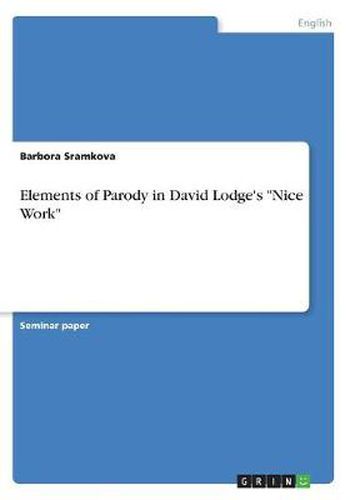Readings Newsletter
Become a Readings Member to make your shopping experience even easier.
Sign in or sign up for free!
You’re not far away from qualifying for FREE standard shipping within Australia
You’ve qualified for FREE standard shipping within Australia
The cart is loading…






Seminar paper from the year 1995 in the subject English Language and Literature Studies - Literature, grade: 1,0, Technical University of Berlin, course: PS David Lodge, 8 entries in the bibliography, language: English, abstract: When thinking about David Lodge and parody, Nice Work might not be the first novel that springs to mind. This is because the generally accepted conception of parody is that of an imitation of a model text, be it a particular piece of writing, the style of an author or the literary modes of a particular period, with the underlying intention of mocking and ironizing the target text. According to this, the natural association would be Lodge’s The British Museum is Falling Down, with a slight deviation as far as the author’s intentions are concerned. The concept of ridicule, which can be traced in most of the parodies in the history of this genre since Aristophanes, is not an inherent feature of parody. The mockery does not always go at the expense of the text parodied, as we can see in the case of The British Museum is Falling Down, which is rather a homage to the background texts. It is the issue of the ethos of parody , which can be ironic, ridiculing, didactic or reverential. This wide pragmatic range of parody results from the ambivalent meaning of the Greek word ‘para’, which means both ‘opposite’ and ‘beside’. Linda Hutcheon suggests that it is this second, neglected meaning of the prefix that broadens the pragmatic scope of parody in a way most helpful to discussions of modern art forms (…). With this in mind, I shall approach Nice Work along the lines of Daniel Ammann’s definition of parody as an activation or flirtation with an intertext (…) sustained over longer stretches(…) as well as of Linda Hutcheon’s statement that parody(…) is a repetition with difference. Defined thus broadly, it meets my conception of Nice Work as a non-standard parody. By this I mean that it is not a homogeneous rewriting of an original (with a
$9.00 standard shipping within Australia
FREE standard shipping within Australia for orders over $100.00
Express & International shipping calculated at checkout
Seminar paper from the year 1995 in the subject English Language and Literature Studies - Literature, grade: 1,0, Technical University of Berlin, course: PS David Lodge, 8 entries in the bibliography, language: English, abstract: When thinking about David Lodge and parody, Nice Work might not be the first novel that springs to mind. This is because the generally accepted conception of parody is that of an imitation of a model text, be it a particular piece of writing, the style of an author or the literary modes of a particular period, with the underlying intention of mocking and ironizing the target text. According to this, the natural association would be Lodge’s The British Museum is Falling Down, with a slight deviation as far as the author’s intentions are concerned. The concept of ridicule, which can be traced in most of the parodies in the history of this genre since Aristophanes, is not an inherent feature of parody. The mockery does not always go at the expense of the text parodied, as we can see in the case of The British Museum is Falling Down, which is rather a homage to the background texts. It is the issue of the ethos of parody , which can be ironic, ridiculing, didactic or reverential. This wide pragmatic range of parody results from the ambivalent meaning of the Greek word ‘para’, which means both ‘opposite’ and ‘beside’. Linda Hutcheon suggests that it is this second, neglected meaning of the prefix that broadens the pragmatic scope of parody in a way most helpful to discussions of modern art forms (…). With this in mind, I shall approach Nice Work along the lines of Daniel Ammann’s definition of parody as an activation or flirtation with an intertext (…) sustained over longer stretches(…) as well as of Linda Hutcheon’s statement that parody(…) is a repetition with difference. Defined thus broadly, it meets my conception of Nice Work as a non-standard parody. By this I mean that it is not a homogeneous rewriting of an original (with a